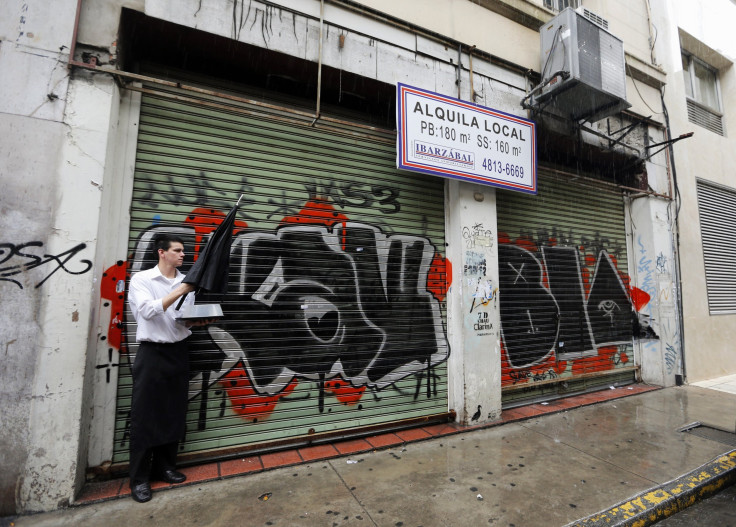Argentina Debt Crisis: What If The Country Defaults Yet Again?

Argentinians awoke on Tuesday to the prospect of yet another default. After an economic and legal standoff that’s lasted more than a decade, the U.S. Supreme Court told Argentina to pay $1.5 billion to “holdout” bondholders at New York hedge fund NML Capital.
Argentina’s president Cristina Fernandez referred to the demands as “extortion” in a passionate televised address hours later in which she promised to find a solution that would allow the country to honor its debts but not pay the court-ordered sum, a sentiment echoed later by economy minister Axel Kicillof, who proposed yet another debt swap as a possible solution.
They two leaders were doing their best to stave off an extremely unpalatable option. Another default would be a serious economic blow. But despite the fiery rhetoric the situation could be worse, and has been worse -- for both Argentina and the global economy.
“Defaults seem very bad and do impose very real costs on the countries, but they’re not as rare as they seem,” said Cameron Brandt, director of research for EPFR Global. This is simply the latest in a string of crises for Argentina in the past century, which could in some ways be a benefit.
In 2001 Argentina defaulted on $82 billion in sovereign bonds, the largest in history. That year, the country’s president resigned and officials devalued the peso as unemployment spiked and riots broke out. Total public debt increased 166 percent by 2002, inflation spiked to 40 percent and reserves shrunk by half. More than 53 percent of Argentines fell below the poverty line.
The debt included roughly $500 million to the United States government, which proceeded to close itself off from future risk, cutting off any lending to Argentina and even rejecting some exports. It took four years for the economy to recover enough to issue restructured bonds valued at 25 to 30 percent of the originals.
That year, Argentina was effectively cut off from global capital markets and remains so today. While a lack of loans has inhibited the country’s economic growth, it also serves to insulate it from its neighbors, which means an impending crisis, though daunting, won’t be nearly as devastating to the rest of the world's finances.
And it's quite possible the country may not default at all.
Some economists argue that Argentina should simply pay the “holdout” creditors and get it over with, or at least try to haggle over a rate that works for both parties. Resignation to payment is a “fairly common view among pundits,” said economist Alan Cibils, chair of political economy department at the Universidad Nacional de General Sarmiento in Buenos Aires.
But the calculations for Argentina’s president are also complicated, politically and financially, Cibils told the International Business Times. Paying the court-ordered $1.5 billion to plaintiffs could expose Argentina to upward of $15 billion in additional claims from other holdouts, which would seriously deplete the country’s $28 billion in foreign reserves.
“That would put Argentina dangerously low. Argentina cannot do that. It cannot afford to do that,” Cibils said.
Other argue that a middle ground would be the best response to the U.S. Court's demands.
“There is no alternative, we have to negotiate with the funds,” Miguel Ángel Broda told the newspaper La Nación, echoing a half-dozen other economists.
La Nación also quoted from a radio América interview with the former president of Argentina’s Central Bank, Mario Blejer: “I don’t rule out any type of negotiation, because I don’t see that there’s an alternative.”
Blejer said, “It would be convenient to resolve this as soon as possible to avoid the negative consequences of an uncertain situation.”
But this is also complex, as Argentine legislation prohibits offering a better rate to the debt holders who didn’t accept the restructured rates.
Another choice is, of course, to default on all the loans, which would buy time for the government to gather enough cash to make repayments in a few years.
A default is never a pleasant option, but a default in 2014 would be nowhere near as devastating as the previous one.
“I would not say that the situations are comparable in terms of magnitude,” said Christine Herlihy, senior Latin America analyst at Frontier Strategy Group.
Last time, Argentina owed $81.8 billion to private bondholders, $6.3 billion to Paris Club lenders and $9.5 billion to the International Monetary Fund, compared to a maximum of roughly $15 billion this time.
On the ground, this would certainly increase borrowing costs, weaken the exchange rate and discourage investors while depleting reserves, all of which would hurt the struggling economy.
“Default would make an already difficult macro situation much harder, and will impede a return to capital markets, which has some potential to ameliorate the situation,” Herlihy said.
However, since Argentina left capital markets in 2001, it essentially insulated itself from other economies, which would make this time around a little less painful, at least for now.
“Argentina has not had access to international bond markets since the crisis in 2001,” said Shannon O’Neil, Senior Fellow for Latin America Studies at the Council on Foreign Relations. “So it’s not as if them defaulting in two weeks will suddenly cut them off.”
In fact, in the short term, the change might not be noticeable, but it doesn’t bode well for Argentina’s economic future. Officials had been trying to rescue its reputation by cutting deals with the Paris Club, and making promises to the IMF, all of which would be for naught.
Defaulting, if the country's officials decide to go that route, “won’t be a change from Friday night to Monday morning," said O'Neil. "But it does mean that barriers to the economy continue to get worse.”
© Copyright IBTimes 2025. All rights reserved.






















